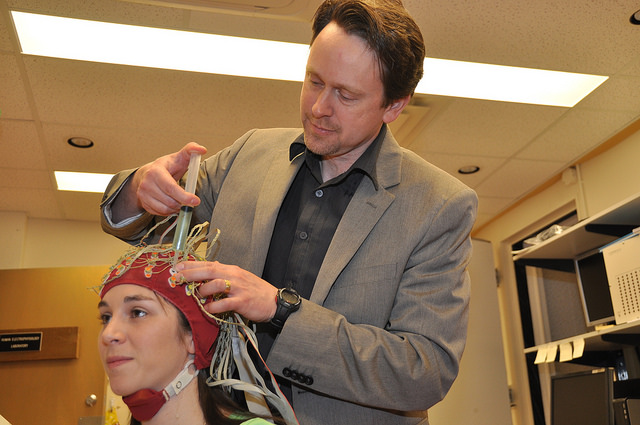
SFU psychologist John McDonald demonstrates how conductive gel is injected into sensors worn by SFU first year master’s student Ashley Livingstone. The gel allows electrical fields to flow from Livingstone’s brain into the researchers’ recording apparatus. Photo Courtesy: SFU Public Affairs Flickr stream.
Two Simon Fraser University psychologists have made a brain-related discovery that could revolutionize doctors’ perception and treatment of attention-deficit disorders. The Journal of Neuroscience has just published a paper about the discovery by John McDonald, an associate professor of psychology and his doctoral student John Gaspar, who made the discovery during his master’s thesis research. The discovery opens up the possibility that environmental and/or genetic factors may hinder or suppress a specific brain activity that the researchers have identified as helping us prevent distraction.
“This is the first study to reveal how our brains rely on an active suppression mechanism to avoid being distracted by salient irrelevant information when we want to focus on a particular item or task,” said McDonald.
McDonald, a Canada Research chair in Cognitive Neuroscience, and other scientists first discovered the existence of the specific neural index of suppression in his lab in 2009. But, until now, little was known about how it helps us ignore visual distractions.
“This is an important discovery for neuroscientists and psychologists because most contemporary ideas of attention highlight brain processes that are involved in picking out relevant objects from the visual field. It’s like finding Waldo in a Where’s Waldo illustration,” says Gaspar. “Our results show clearly that this is only one part of the equation and that active suppression of the irrelevant objects is another important part.”
The psychologists say their discovery could help scientists and health care professionals better treat individuals with distraction-related attentional deficits. The researchers are now turning their attention to understanding how people deal with distraction. They’re looking at when and why people can’t suppress potentially distracting objects.

